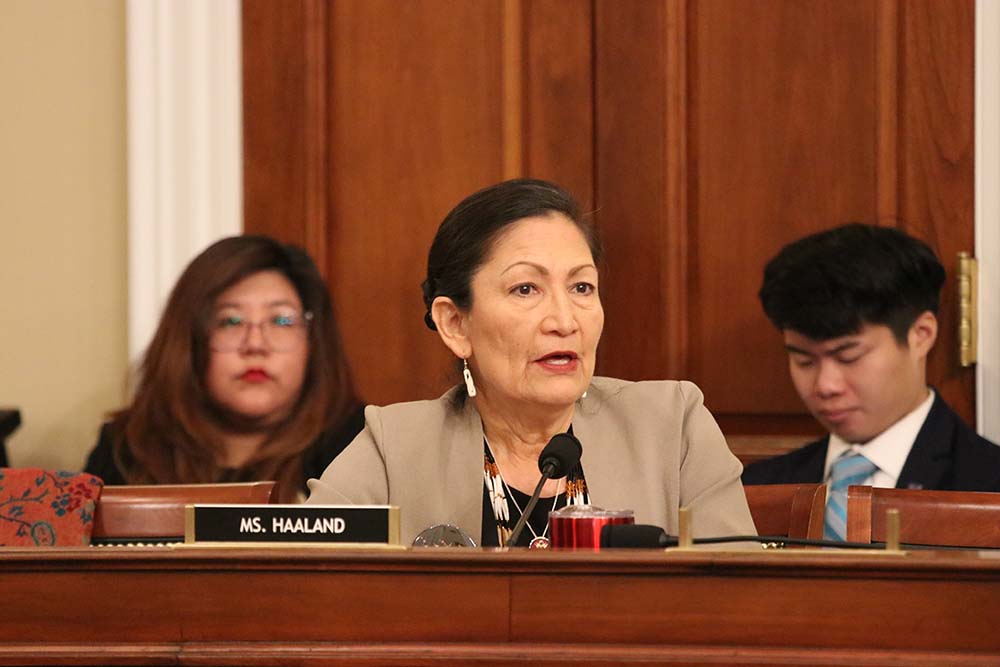
- Details
- By Jenna Kunze
WASHINGTON — In the first week of Women’s History Month, New Mexico Rep. Deb Haaland has found a niche way to be celebrated, paving the way to become the first Native American woman to serve as a Cabinet member in the United States government.
On Thursday morning, the Senate Committee on Energy and Natural Resources voted 11-9 in favor of recommending Haaland — a citizen of the Laguna Pueblo — to the eighth most powerful position in government: Secretary of the United States Department of the Interior.
Sen. Lisa Murkowski, Republican lawmaker from Alaska, was the only party member to cross the aisle and join Democrats' vote to confirm Haaland.
Murkowski said that — despite her own doubts, her constituent’s concerns that the new administration’s opposition to resource development on public lands will threaten key projects in the state, and her experience confirming an Obama-era secretary who promised to be a good partner, “and proved to be anything but after confirmations” — she would support Haaland’s nomination.
“I am going to place my trust in Representative Haaland and her team despite some very real misgivings,” Murkowski said. “And I guess I would direct this to Representative Haaland, if you're listening, know that I intend to work with you, because I want you to be successful and quite honestly, we need you to be successful.”
Speaking against her on Thursday was Sen. John Barrasso (R-WY), who said that Haaland’s “extreme policy views and lack of substantive answers during the hearing disqualify her for this job.”
During a two-day hearing last week, Republican senators repeatedly questioned Haaland to express her own views on matters such as halting the Keystone XL Pipeline, but she consistently abstained from expressing her own views, stating instead that, “If I'm confirmed as secretary, it's President Biden's agenda, not my own agenda, that I would be moving forward.”
“If she is allowed to pursue her Green New Deal-inspired policies at the Department of the Interior, she will run Wyoming and other states’ economies into a ditch,” Sen. Barasso said.
Washington Sen. Maria Cantwell said she was appalled by her colleagues’ pressing of Haaland.
“I don't begrudge any of my colleagues for disagreeing with the policies of the president of the United States,” she said. “But I was in the room and I heard her answer these questions, and I really felt (egreged) that people kept pushing her on her answers when she was clear what the president supported.”
Along with Cantwell, Sen. Martin Heinrich of New Mexico said he was disappointed by the “tenor of the debate” in the committee, as well as some senator’s characterization of Haaland as radical or extreme.
The positive majority vote means that Rep. Haaland’s nomination will now go in front of the full Senate, which could happen before the Senate breaks for two weeks on March 26, or after they resume session April 12, according to political expert Holly Cook Macarro (Red Lake Band of Ojibwe).
If confirmed by the full senate, Haaland will immediately resign her seat in the House of Representatives and be sworn into office as the 54th Secretary of the Department of the Interior, Cook Macarro said.
National Congress of American Indians President Fawn Sharp said in a statement that “it is fitting that while we celebrate Women’s History Month, Deb Haaland is poised to make it.”
On Twitter shortly after the vote, Haaland wrote that her life experiences give her hope for the future. “If an Indigenous woman from humble beginnings can be confirmed as Secretary of the Interior,” she wrote, “our country and its promise still holds true for everyone.”
More Stories Like This
Native News Weekly (August 25, 2024): D.C. BriefsUS Presidents in Their Own Words Concerning American Indians
Native News Weekly (December 14, 2025): D.C. Briefs
Wounded Knee Massacre Site Protection Bill Passes Congress
Two Murdered on Colville Indian Reservation
Help us defend tribal sovereignty.
At Native News Online, our mission is rooted in telling the stories that strengthen sovereignty and uplift Indigenous voices — not just at year’s end, but every single day.
Because of your generosity last year, we were able to keep our reporters on the ground in tribal communities, at national gatherings and in the halls of Congress — covering the issues that matter most to Indian Country: sovereignty, culture, education, health and economic opportunity.
That support sustained us through a tough year in 2025. Now, as we look to the year ahead, we need your help right now to ensure warrior journalism remains strong — reporting that defends tribal sovereignty, amplifies Native truth, and holds power accountable.
 The stakes couldn't be higher. Your support keeps Native voices heard, Native stories told and Native sovereignty defended.
The stakes couldn't be higher. Your support keeps Native voices heard, Native stories told and Native sovereignty defended.
Stand with Warrior Journalism today.
Levi Rickert (Potawatomi), Editor & Publisher

